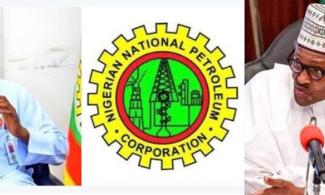
Just hours after President Bola Tinubu's announcement that fuel subsidy had been eliminated, Kyari stated that the federal government still owed NNPCL N2.8 trillion for petrol subsidy payments, which the company had covered from its cash flow.
A forensic audit conducted by KPMG, a global accounting firm, has uncovered a significant discrepancy in the fuel subsidy claims made by the Nigerian National Petroleum Company Limited (NNPCL).
The audit revealed that NNPCL inflated its fuel subsidy claims by a staggering N3.3 trillion, according to a report done by iWitnessLive.
Initially, NNPCL reported spending N6 trillion on fuel subsidy, with the government of former President Muhammadu Buhari paying a substantial portion.
However, NNPCL's Group CEO, Mele Kyari, claimed that the company was still owed N2.8 trillion. Just hours after President Bola Tinubu's announcement that fuel subsidy had been eliminated, Kyari stated that the federal government still owed NNPCL N2.8 trillion for petrol subsidy payments, which the company had covered from its cash flow.
The government has yet to reimburse NNPCL for this amount, the May 2024 report said.
“Since the provision of the N6tn in 2022, and N3.7tn in 2023, we have not received any payment whatsoever from the Federation.
“That means they (the Federal Government) are unable to pay and we’ve continued to support this subsidy from the cash flow of the NNPC. We are waiting for them to settle up to N2.8tn of NNPC’s cash flow from the subsidy regime and we can’t continue to build this,” he said.
Meanwhile, the Nigerian Government plans to conduct a fresh audit of the N2.8 trillion fuel subsidy claim made by NNPC Limited, following a reconciliation by KPMG that reduced the claims to N2.7 trillion.
The audit, which will cover 2015-2021, aims to verify the authenticity of NNPC's claims. The Office of the Auditor-General for the Federation (OAuGF) will lead the audit, with the option to engage an external firm for additional support.
The decision was made during a Federal Account Allocation Committee (FAAC) meeting in March 2024, where members discussed the need for an independent audit to prevent conflicts of interest.
The Minister of Finance and Coordinating Minister of the Economy, Wale Edun, emphasised President Tinubu's commitment to the forensic audit, while commissioners from various states shared their perspectives on the matter.
According to the minutes, the Ogun State Commissioner for Finance suggested engaging an independent auditor to ensure a conflict-free exercise, benefiting all tiers of government. The Niger State finance commissioner supported this stance, emphasizing inclusiveness and objectivity.
Rivers State, however, noted that an independent auditor doesn't guarantee success, recommending a combined approach with OAuGF and external firms.
The Federal Commissioner, Revenue Mobilization, Allocation and Fiscal Commission/Chairman, Indices and Disbursement explained that the audit aims to resolve outstanding claims, including the reduced N2.7tn claim against NNPC Limited.
KPMG's initial audit recommended further investigation. The meeting concluded that OAuGF will lead the audit, with external support as needed.
“Contributing, the Federal Commissioner, Revenue Mobilization, Allocation and Fiscal Commission/Chairman, Indices and Disbursement observed that the proposed audit was in respect of some outstanding claims which include the N6tn against NNPC Limited that was subsequently reduced to N2.7tn after initial reconciliation. He informed members that KPMG which carried out the earlier audit exercise of NNPC had looked at some of the claims and recommended further audit to resolve them.
“Concluding, the meeting agreed that OAuGF would be considered first and an external audit firm would be engaged when necessary to provide additional support,” the minutes read in part.
Follow the Sahara Reporters channel on WhatsApp: https://whatsapp.com/channel/0029VaFClvtH5JM6SSsP7M2Y